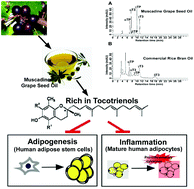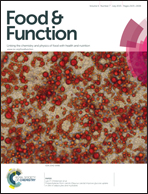Muscadine grape seed oil as a novel source of tocotrienols to reduce adipogenesis and adipocyte inflammation
Abstract
Tocotrienols are unsaturated forms of vitamin E previously shown to reduce adipogenesis and adipose inflammation. In this study, muscadine grape seed oil (MGSO) was identified as a novel source of tocotrienols containing significant amounts of α- and γ-tocotrienol (T3) with minor seasonal changes. The aim of this study was to assess the anti-adipogenic and anti-inflammatory potential of MGSO by using primary human adipose-derived stem cells (hASCs). Differentiating hASCs were treated with MGSO and compared with rice bran and olive oil. Accumulation of triglyceride was significantly lower in MGSO-treated hASCs than rice bran and olive oils. A tocotrienol rich fraction (TRF) from MGSO was prepared by solid phase extraction and eluted with 15% 1,4-dioxane in hexane. The MGSO-derived TRF treatment significantly reduced mRNA and protein expression that are crucial to adipogenesis (e.g., PPARγ and aP2) in hASCs. Furthermore, TRF from MGSO markedly reduced LPS-induced proinflammatory gene expression in human adipocytes and cytokine secretion to the medium (IL-6 and IL-8). Collectively, our work suggests that MGSO is a stable and reliable natural source of T3 and MGSO may constitute a new dietary strategy to attenuate obesity and its associated adipose inflammation.


 Please wait while we load your content...
Please wait while we load your content...